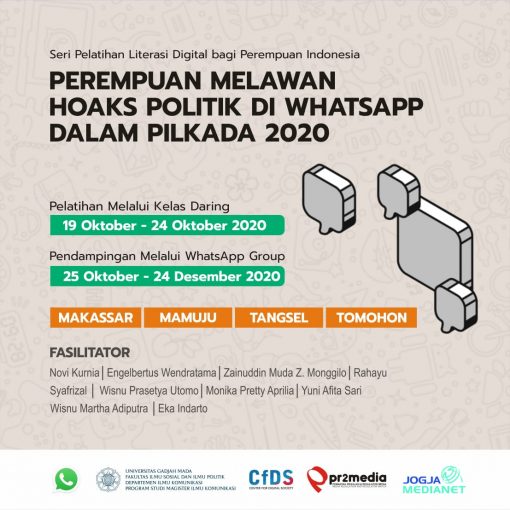
Jakarta, October 19th 2020—Gadjah Mada University (UGM) and Whatsapp launched a training program themed “Women Against Political Hoax through Whatsapp in the 2020 Regional Election” to support the women community in four cities in being an agent of change to fight political fake news. This training is a continuation of the research titled “WhatsApp group and the Digital Literacy of Indonesia’s Women” which was published in the start of the year by UGM’s Department of Communication Studies. For most women, Whatsapp is a place for their social life where half of the Whatsapp group is meant to communicate with family and friends. Amongst 250 women respondents, 70% admitted to have up to 10 WhatsApp groups where they often encounter fake news and disinformation.
“Research also shows that 74% of women that encounter fake news choose not to respond to the message to avoid conflict. In reality, we see that women can be change makers in their community as long as they get a good digital literacy training. This is why we collaborate with Whatsapp to do this training program,” Novi Kurnia said, the Head of UGM Magister Communication Studies Program.
One of the students was Andi Sri Wulandani, a 38 year old woman from Makassar. Andi once worked at the Election Committee of Sopeng District and headed a research institution in Makassar. “Everyone, including me, uses Whatsapp as a way to communicate with friends, family, and work mates,” Andi said. “Without sufficient knowledge and awareness, it’s easy for us to be trapped in information that we do not know is credible or not. That is why I can’t wait to participate in this program in the hopes that I can share the knowledge with my community. I believe we can learn to fight hoax together in a collaborative way.”
Pelatihan ini akan diadakan di empat kota/kabupaten terpilih, yakni Tangerang Selatan, Mamuju, Tomohon, dan Makassar. Keempat lokasi ini diidentifikasi oleh Badan Pengawas Pemilihan Umum (Bawaslu) dan Komisi Pemilihan Umum (KPU) sebagai daerah yang rentan
This training will be done in four chosen places; Tangerang Selatan, Mamuju, Tomohon, and Makassar. Those four locations are identified by the Election Oversight Department and the Election Committee as zones prone to conflict because of disinformation. Novi, as the training coordinator, added “In Makassar alone, 58% women get an average of one to three messages that mislead them in their Whatsapp group. More than ¾ of those messages are connected to politics.”
The Whatsapp APAC Public Policy Director Clair Deevy believes that technology and an increase of digital literacy can be a great solution for this issue. “Whatsapp has a great spam detector technology,” Deevy said. “With this technology, WhatsApp can detect accounts with suspicious activities, like accounts that just registered and shared plenty of messages immediately. These accounts can be misused to share spam and hoax.”
Deevy elaborated further, “However, Whatsapp still advises users to check the facts behind a message before sharing it. Users are also advised to share information from credible and trusted sources. Therefore, we are very enthusiastic to work with institutions such as UGM to train Whatsapp users to fight against hoaxes and disinformation.”
This training will go from 19 to 23 October 2020, followed by an accompaniment session by the end of the year. The students will be divided into several groups and get a mentoring session through Whatsapp group. They will also be given course materials that can make it easy for them to share the knowledge with their community in the future.
